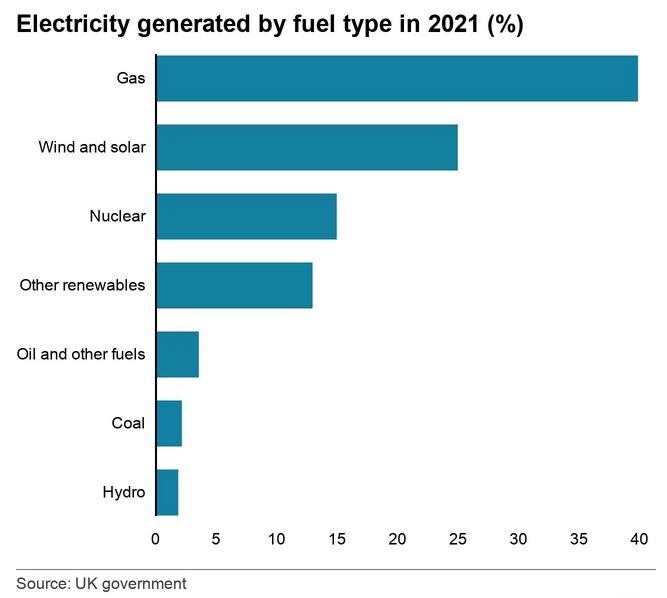
Public won't be told to cut energy use after No10 objects
A source said there was a "reasonably well-developed plan" to encourage household energy-saving.
But Climate Minister Graham Stuart denied a Times report that a campaign had been blocked by Downing Street.
He said UK energy was secure despite a National Grid warning of blackouts.
Its message about possible power cuts was based on a worst-case scenario of gas shortages if the energy crisis in Europe escalates.
The Department for Business, Energy and Industrial Strategy (BEIS) was considering plans to encourage households to switch off their appliances and heating to conserve energy whenever possible during winter.
However, the BBC was told the department was stopped from taking the plan forward because of objections from the prime minister's office and the Department of Health and Social Care (DHSC).
DHSC sources said they did not believe they had played any specific role in any decision, but indicated there might be broad "concern about the elderly being afraid to turn on their heating".
The Times newspaper reported that Downing Street's intervention came on Thursday when National Grid issued its warning.
The UK is heavily reliant on gas to produce electricity, with gas-fired power stations generating more than 40% of the country's electricity.
In the "unlikely" event that gas supplies ran extremely low, homes and businesses in the UK could face three-hour planned blackouts, National Grid said.
The government says National Grid has drawn up plans to launch a voluntary service to reward users who reduce demand at peak times.
Speaking on BBC Breakfast, Mr Stuart said he was "confident the government has done everything in its power" to make sure energy rationing would not be necessary this winter.
But he added: "We make plans for all scenarios."
During the Conservative leadership campaign, Prime Minister Liz Truss pledged there would be no energy rationing this winter.
On Thursday, when asked if she could guarantee there would be no blackouts, Ms Truss said: "We do have a good supply of energy in the UK."

In a statement, BEIS said: "There are no plans for the government to tell the public to reduce usage for the sake of our energy supplies.
"The UK has a secure and diverse energy system and we are confident that the steps we are taking will protect security of electricity and gas supplies."
When asked to comment, Mr Stuart indicated there had been discussions within BEIS, but confirmed there would not be a government-led effort to get people to reduce usage, saying "it has been decided that there will not be a campaign".
Mr Stuart also denied that a well-developed campaign had been prepared and then blocked by the prime minister's team.
How will the demand flexibility system work?
National Grid wants to be able to reduce British energy demand at peak times if there is going to be a shortage.
This winter, starting in November, it is going to have 12 trial days where it asks customers who have signed up via their energy suppliers to reduce the amount of energy they are using at particular times of day.
They would be given a day's notice that they would be asked to do this.
In return, they would be paid for using less energy. National Grid has not yet decided how this will work but has suggested that for the trial days customers might be able to make back £10 a day.
Expect National Grid to announce more details later this month with customers being able to sign up from 1 November as long as their energy suppliers are participating in the scheme.
The Times newspaper had reported that the prime minister had rejected plans for a £15m public information campaign, which was signed off by Business Secretary Jacob Rees-Mogg.
It suggested Ms Truss was "ideologically opposed" to the campaign amid concerns it would be too interventionist.
In her speech to the Conservative Party conference on Wednesday, the prime minister said her conservatism was about "freedom".
"I'm not going to tell you what to do, or what to think or how to live your life," she said.
Some question whether a campaign is needed at a time when many people are already changing their behaviour and saving energy where they can.
But those with knowledge of a campaign say they don't understand the logic of blocking it. "Slightly mystifying," they say.
In a tweet, Conservative MP Guy Opperman said he would he "fully behind" an energy-saving campaign that would help people and the taxpayer save money.
"This is not Nanny state," he wrote, arguing it was about "preserving supply, saving money for everyone, and encouraging localism".
Stew Horne, head of policy at not-for-profit organisation Energy Saving Trust, said the government needed to consider how to reduce demand this winter to increase energy security.
He said the European Commission had recently announced plans to reduce peak demand by 5% across EU member states. In Italy, central heating use will be reduced and households have been asked to turn down their thermostats to reduce energy demand.
Mr Horne said he "would welcome consideration of similar measures to improve energy security".
Russia's invasion of Ukraine has caused turmoil and volatility in the energy markets, sending fuel bills rocketing, and tightening supplies of oil and gas globally.
Ahead of winter, countries across Europe are scrambling to shore up supplies, as gas flows from Russia are restricted.
Since taking office Ms Truss's government has been seeking to boost energy security, with a ban on fracking for shale gas in England lifted last month, and a new oil and gas exploration licensing round launched on Friday.
This comes after government stepped in with an energy support package to help people with soaring bills.










